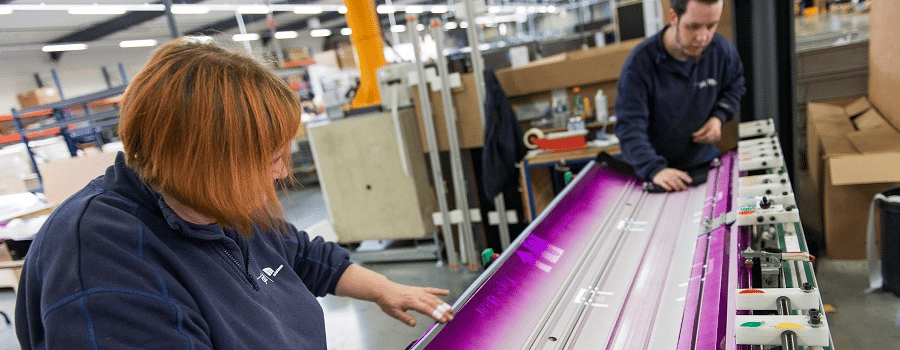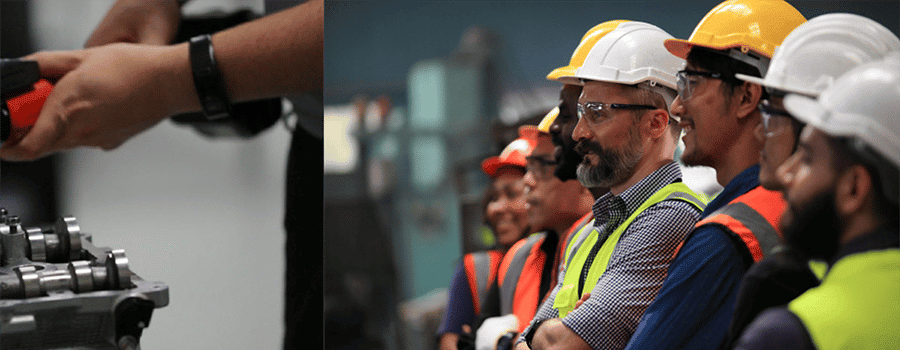INDUSTRY 5.0: HOW LICHTWERK AND LIGHTGUIDEAR PUT PEOPLE FIRST WITH TECHNOLOGY

The fourth industrial revolution (Industry 4.0), characterised by the increasing importance of digitalisation and technology at the core of production and production systems, is fundamentally changing the way manufacturing works. Digital technologies are helping manufacturing companies adapt to the increasing customer demand for smaller runs of increasingly complex products, more varied and personalised ranges, and higher quality requirements.
The emergence and integration of technologies such as artificial intelligence, Internet of Things, digital twinning, augmented and virtual reality, 3D printing, digital work instructions, personalised interfaces, and big data make companies feel the pressure to work radically differently, which is exacerbated by problems in the supply chain, labour market shortages, and the energy crisis. And all this at an unprecedentedly fast pace!
Due to the fast pace and unpredictability, there is a chance of losing sight of the human factor. That is why more and more companies are resolutely playing the card of Industry 5.0, in which smart collaboration between people and technology is the engine for sustainable growth and a resilient industry.

Lichtwerk makes complex work accessible
Based on a ‘Go Digital, Stay Human’ strategy and approach, Lichtwerk (www.lichtwerk.io) supports companies in the implementation of smart inclusive technologies, such as LightGuide Augmented Reality. Lichtwerk provides advice, infrastructure, and training. The innovative approach and solutions are applicable in all sectors, as permanent support or as training.
LightGuide Augmented Reality
Together with the American partner LightGuide (www.lightguidesys.com), Lichtwerk develops versatile projection-based Augmented Reality solutions for the manufacturing industry. Work instructions are projected step by step on the workstation by means of icons, photos, videos, pick-to-light methods …
With pick-to-light, employees receive visual instructions for picking various components in different quantities. Numbers and locations are dynamically projected onto the work space.
Through vision systems and measuring devices, interactivity and feedback are built in. This increases the competencies of employees and leads to higher product quality, more flexibility and scalability. Untrained operators can learn new tasks faster and companies can guarantee quality up to 100%, even for the most complex assignments.
By using AR workstations and digital work instructions, companies are therefore achieving a double goal: they are taking steps in the field of digitisation and technological transformation (Industry 4.0), while at the same time strengthening their human capital (Industry 5.0).
The LightGuide platform integrates with numerous hardware and software solutions, including MES systems, PLCs, and peripherals such as coupling tools. The low-code’ visual user interface also enables companies to draw up, adapt, and improve digital work instructions based on data and real-time analytics.
Impact study
Lichtwerk considers it important to be a partner in various research projects in order to promote the exchange of knowledge between industry, research centres, and academia.
A study conducted by the Catholic University of Leuven (Huang, 2018) in collaboration with Mariasteen, a Belgian Work Integration Social Enterprise (WISE) and important supplier to various Belgian, Dutch, and international production companies, shows that the well-being of employees increases through the use of LightGuideAR: operators experience less stress and complexity, and more autonomy and empowerment. The quality of the work they deliver is also higher: fewer mistakes are made and there is more ‘quality by guidance’. Finally, the research finds that the technology also has a positive impact on productivity: the use of LightGuideAR increases the agility and efficiency of an entire department in a company. A similar study in the Netherlands (Bosch and van Rhijn, 2017) confirms the results of Huang (2018).
Versatile applications
In recent years, LightGuide has been used by numerous leading manufacturers in a large number of sectors, including automotive, aviation, electronics, food, the medical sector, and the manufacturing industry. Wherever complex manual work can be found, the LightGuide system ensures immediate results on the factory floor.
Lichtwerk has also already implemented the technology at customers in various sectors and for very diverse and versatile applications. For example, the assembly of tram panels, an assignment from Hydro Extruded Solutions, is done with the help of interactive work instructions. The profiles are pressed in the factory in Harderwijk and are assembled by means of friction welding. They are milled and painted at an external party, after which the final assembly takes place with the support of the LightGuideAR platform.
The production of so-called bed beams for MedTech company Heyer also takes place with the help of the augmented reality solution. The bedside wall panels for hospitals provide electricity, alarms, data transfer, and diagnostics, and are often room- or department-specific. Thanks to the visual and interactive support of the LightGuideAR platform, the installation of the technical components is done by employees with a distance to the labour market and the quality is 100% guaranteed. For example, more than one thousand ‘series of 1’ bed beams have already been produced, including for hospital AZ Delta in Roeselare (Belgium).
The technology is not only used for permanent support, but also for training, up-skilling, and re-skilling employees. For example, the LightGuide technology ensures that shortly educated operators or employees with a distance to the labour market can (continue to) hold relevant positions in an increasingly digitising and automating production environment.

People-centric technology for a sustainable and resilient industry
People-centredness, like sustainability, is no longer an option, it is a necessity. Companies understand that creating sustainable products, services, and production systems is the new norm for survival in the manufacturing industry and come to the realisation that a people-centred approach to digitisation and technologization is crucial.